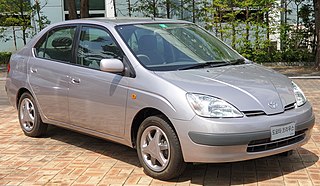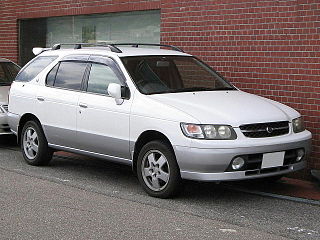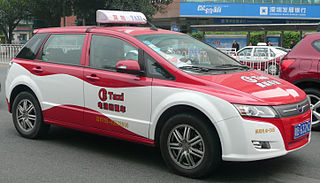Related Research Articles

A hybrid vehicle is one that uses two or more distinct types of power, such as submarines that use diesel when surfaced and batteries when submerged. Other means to store energy include pressurized fluid in hydraulic hybrids.

A compressed-air car is a compressed-air vehicle fueled by pressure vessels filled with compressed air. It is propelled by the release and expansion of the air within a motor adapted to compressed air. The car might be powered solely by air, or combined with other fuels such as gasoline, diesel, or an electric plant with regenerative braking.

An electric vehicle (EV) is a vehicle that uses one or more electric motors for propulsion. It can be powered by a collector system, with electricity from extravehicular sources, or it can be powered autonomously by a battery. EVs include, but are not limited to, road and rail vehicles, surface and underwater vessels, electric aircraft, and electric spacecraft. For road vehicles, together with other emerging automotive technologies such as autonomous driving, connected vehicles, and shared mobility, EVs form a future mobility vision called Connected, Autonomous, Shared, and Electric (CASE) Mobility.

A compressed-air vehicle (CAV) is a transport mechanism fueled by tanks of pressurized atmospheric gas and propelled by the release and expansion of the gas within a pneumatic motor.

GS Yuasa Corporation is a Kyoto-based Japanese company specializing in the development and production of lead acid and lithium-ion batteries, used in automobiles, motorcycles and other areas including aerospace and defense applications.

The Commuter Cars Tango is a prototype ultra-narrow electric sports car designed and built by Commuter Cars, an electric car company based out of Spokane, Washington.

The Nissan R'nessa is a station wagon manufactured by Nissan Motors from 1997 to 2001. According to Nissan, the name derives from "packaging renaissance for versatile, spacious comfort on wheels."

The Tesla Roadster is a battery electric vehicle (BEV) sports car, based on the Lotus Elise chassis, that was produced by the electric car firm Tesla Motors in California from 2008 to 2012. The Roadster was the first highway legal serial production all-electric car to use lithium-ion battery cells and the first production all-electric car to travel more than 320 kilometres (200 mi) per charge. It is also the first production car to be launched into deep space, carried by a Falcon Heavy rocket in a test flight on February 6, 2018.
The Progressive Insurance Automotive X Prize was a set of competitions, programs and events, from the X Prize Foundation, to "inspire a new generation of super-efficient vehicles that help break America's addiction to oil and stem the effects of climate change." Progressive Insurance was the title sponsor of the prize, the centerpiece of which is the Competition Division, within which a 10-million-dollar purse was divided between the winners of three competitions.

A123 Systems, LLC, a subsidiary of the Chinese Wanxiang Group Holdings, is a developer and manufacturer of lithium iron phosphate batteries and energy storage systems.

An electric vehicle battery is a rechargeable battery used to power the electric motors of a battery electric vehicle (BEV) or hybrid electric vehicle (HEV).
Mahindra Electric Mobility Limited, formerly known as the Reva Electric Car Company, is an Indian company based in Bangalore, involved in designing and manufacturing of compact electric vehicles. The company's first vehicle was the REVAi electric car, available in 26 countries with more than 4,000 of its different versions sold worldwide by mid-March 2011. Reva was acquired by Indian conglomerate Mahindra & Mahindra in May 2010. After the acquisition, the company launched the electric hatchback e2o in 2013. Today, the company sells electric vehicles in different segments – the electric sedan eVerito, the electric commercial vehicle eSupro, and the Treo range of low maintenance, lithium-ion battery-powered three-wheelers. Recently, Mahindra Electric became the first Indian car manufacturer to cross 170 million kilometers traveled on its fleet.

A battery electric vehicle (BEV), pure electric vehicle, only-electric vehicle, fully electric vehicle or all-electric vehicle is a type of electric vehicle (EV) that exclusively uses chemical energy stored in rechargeable battery packs, with no secondary source of propulsion. BEVs use electric motors and motor controllers instead of internal combustion engines (ICEs) for propulsion. They derive all power from battery packs and thus have no internal combustion engine, fuel cell, or fuel tank. BEVs include – but are not limited to – motorcycles, bicycles, scooters, skateboards, railcars, watercraft, forklifts, buses, trucks, and cars.
Triac, by Green Vehicles Inc., was a two-seat three-wheeled concept car unveiled in 2010–2011. The company went out of business in 2011.

Advanced Technology Vehicles Manufacturing (ATVM) Loan Program is a $25 billion direct loan program funded by Congress in fall 2008 to provide debt capital to the U.S. automotive industry for the purpose of funding projects that help vehicles manufactured in the U.S. meet higher mileage requirements and lessen U.S. dependence on foreign oil. Of the 108 requests made, 5 were approved to receive $8.4 billion, with the majority of that amount under repayment.

The patent encumbrance of large automotive NiMH batteries refers to allegations that corporate interests have used the patent system to prevent the commercialization of nickel metal hydride (NiMH) battery technology. Nickel metal hydride battery technology was considered important to the development of battery electric vehicles, plug-in hybrid electric vehicles (PHEVs) and hybrid electric vehicles (HEVs) before the technology for lithium-ion battery packs became a viable replacement.

CODA Automotive Inc. was a privately held American company headquartered in Los Angeles, California. The company designed and assembled lithium-iron phosphate (LiFePO4) battery systems for automotive and power storage utility applications, and electric cars. Miles Automotive partnered with Hafei and Qingyuan Electric Vehicle to establish Coda Automotive as an affiliate company. The name CODA comes from the musical term for the concluding passage of a piece of music. CODA Automotive has said that it chose the name because its electric vehicle technology represents an end for combustion engine vehicles, and the start of the electric vehicle era.

The Hyundai Blue-Will is a plug-in petrol-electric hybrid concept compact car designed by the South Korean car manufacturer Hyundai Motor Company. The vehicle was debuted at the 2009 Seoul Motor Show in South Korea.

The electric vehicle industry in China is the largest in the world, accounting for around 57.4% of global production of electric vehicles (EVs) and around 500,000 exports in 2021. In 2021, CAAM reported China had sold 3.34 million passenger electric vehicles, consisting 2.73 million BEVs and 0.6 million PHEV, which is around 53% share of the global market of 6.23 million "new energy" passenger vehicles – BEVs, PHEVs, and HEVs. China also dominates the plug-in electric bus and light commercial vehicle market, reaching over 500,000 buses and 247,500 electric commercial vehicles in 2019, and recording new sales of 186,000 commercial EVs in 2021.
Contemporary Amperex Technology Co. Limited, abbreviated as CATL, is a Chinese battery manufacturer and technology company founded in 2011 that specializes in the manufacturing of lithium-ion batteries for electric vehicles and energy storage systems, as well as battery management systems (BMS). With a market share of 32.6% in 2021, CATL is the biggest lithium-ion battery manufacturer for EVs in the world, producing 96.7 GWh of the global 296.8 GWh, up 167.5% year on year. It grew even further in 2022, increasing its market share to 37%. The company plans to have a manufacturing capacity target of more than 500 GWh by 2025 and more than 800 GWh by 2030.
References
- ↑ "Will Recycling be a Selling Point for an Electric Car?". 4 August 2010.
- ↑ "2010 Detroit Auto Show: Green Vehicles' Triac All-Electric Vehicle - 4wheelsnews.com". Archived from the original on 2011-07-07. Retrieved 2010-06-17.
- ↑ Contracts energy.ca.gov [ dead link ]
- ↑ Electric Car Maker Folds, Salinas Loses $500,000. KSBW. Retrieved July 18, 2011.